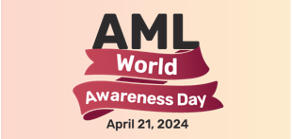April 21st is AML Awareness Day!

Don’t miss The Future of AML Treatment: What’s Next? webcast on May 14, 2024 at noon Eastern
What is AML? Acute myeloid leukemia is the most common type of acute leukemia in adults. Although AML can occur at any age, adults aged 60 years and older are more likely to develop the disease than younger people. For more information about AML in children, visit www.LLS.org/booklets to view the free LLS booklet Acute Myeloid Leukemia in Children and Teens.
AML is a type of cancer in which the bone marrow makes too many immature blood cells called "myeloblasts." In AML, a mutation or a series of mutations in the DNA (genetic material) of a single myeloid stem cell results in the formation of an abnormal myeloblast. This abnormal myeloblast does not develop into a healthy, functioning myeloid cell. It becomes a leukemia cell (also referred to as an “AML cell” or a "leukemia blast cell”). These genetic errors in the mutated cell cause the leukemia cell to keep growing and dividing, whereas a healthy cell would stop dividing and eventually die. Every cell that arises from the initial leukemia blast cell also has the mutated DNA. As the leukemia cells multiply uncontrollably, they quickly accumulate in the bone marrow. This slows down or stops the production of normal, healthy red blood cells, white blood cells and platelets. As a result, there are too many leukemia blast cells (immature cells) and not enough mature, functional red and white blood cells and platelets. (from the LLS booklet Acute Myeloid Leukemia in Adults.
LLS supports people diagnosed with AML and their caregivers every day. In addition to the booklets above, patients can find the following:
Information Specialists to provide support and resources
Clinical Trial Support Center to provide information and help patients navigate clinical trials
Nutrition Education Services Center to provide information on nutrition and diet
Online Chats for acute leukemias for weekly support
LLS Community AML Group for online support
Patti Robinson Kaufmann First Connection Peer Support Program for 1:1 phone/email connections with a peer
LLS offers education programs for patients and caregivers to learn more about their diagnosis, treatment, and resources available (upcoming program listed above). Visit LLS Webcasts for more information on past programs.